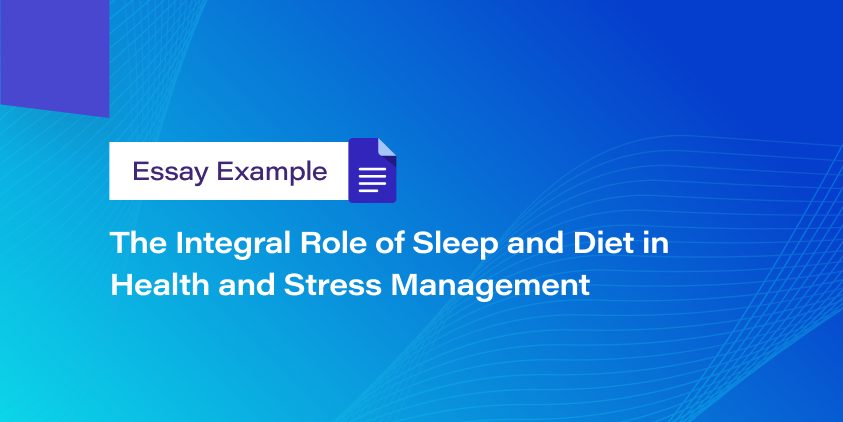The Integral Role of Sleep and Diet in Health and Stress Management

Health Psychology
Among the positions estimated to have the lowest score during the survey, I identified the following: I sleep enough to maintain a high level of health and cope successfully with daily challenges. Pursuing this domain is vital for improving health and maintaining a consistent stress-resistant body.
In contrast, sleep defiance alters activity in parts of the brain. Moreover, sleep deprivation can be dangerous because daytime sleepiness interferes with daily activities and may lead to hazardous consequences. Subsequently, people who do not sleep enough hours have trouble making decisions, experience difficulties solving problems, controlling emotions and coping with stressful activities.
Finally, a lack of sleep has a resilient influence on health. It is often associated with an increased level of cardiovascular mortality. Sleep problems that persist for longer than a week cause constant fatigue, dysthymia, bipolar disorder, anxiety, and even depression (National Institutes of Health, 2012). Therefore, to be healthy, sleeping enough hours is a necessity.
A strategy for getting enough sleep must be implemented to be healthy and stress-resistant. Day one: the first step towards improving sleep is reducing caffeine consumption. Caffeine can cause sleep problems up to twelve hours after consumption. Thus, I must quit drinking coffee in the morning and during the breaks. During the next day, the second necessary step would be changing my eating habits and adding special nighttime snacks. I would add to my dinner milky products, such as yogurt or banana milkshake, which help to release the day’s stress and help promote sleep. On day three, I would experiment with taking a warm, relaxing bathroom, listening to soft music and doing easy stretches. All these activities I would add to my daily routine. The last strategic plan is to add a 20 min walk daily. It is estimated that daily exposure to bright sunlight in the morning and during the day increases melatonin and, therefore, helps regulate a sleep-wake cycle (National Institutes of Health, 2012). Thus, on the last day of the experiment, I would eat my breakfast outside and walk my dog during the day instead of in the evening to spend time effectively. Implementing this strategic plan would help me to sleep more effectively, boost my health, and become more stress-resistant.
Another position that had the lowest grade in the survey is the following: My diet is conducive to good health and stress management. The fast way of living forces many people to have snacks on the way home or to work. In addition, people often skip breakfasts due to a constant lack of time in the mornings. The majority of foods the society consumes are unhealthy and lead to various health issues such as obesity, high blood pressure, and even such diseases as diabetes.
The unconducive diet may trigger major health risks and even cause death. If people neglect healthy eating habits, they can have osteoporosis, hypertension, or even certain types of cancer (British Nutrition Foundation, 2016). When healthy dietary habits are established in adolescence, it helps to maintain good health throughout the entire life. Some kinds of foods are even able to boost stress. Such snacks as potato chips, coffee, ice cream, granola bars, and French fries overload simple carbs. Therefore, these nutrients spike the level of glucose and cortisol, which is the opposite substance of what a stressed body needs (British Nutrition Foundation, 2016). In addition, when stressed, most people consume salty, sweet or greasy food, which enhances it instead of dismissing stress. Therefore, a conducive diet is necessary to build a healthy, stress-resistant, and vigorous body.
To be healthy and more resilient to everyday stress, I need to change my daily menu and make it more conducive. The first strategy to be implemented is reducing sugary drinks, caffeine, and greasy fast food. Instead, on the first day, I would include more red, orange, and green fruits and vegetables into my regular menu. These foods are rich in vitamins, minerals, and fiber necessary to keep the body healthy. Therefore, I would prepare healthy meals at home instead of eating sandwiches during breaks and add oranges, tomatoes, or broccoli. Also, my food lacks whole grains. Therefore, on the second day, I would change the bread I eat daily into whole grain. The sugar addiction is one of the major drawbacks of my menu. Thus, I would eat foods that do not contain sugar and solid fats. Several such snacks as cookies, cakes, butter desserts, or ice cream would be sufficiently reduced in my daily menu. Considering that people who consume more calories than they need are more vulnerable to stress than those who eat healthily, I would exclude such empty calories as soda drinks, whole milk, high-fat salad dressings, various fried treats, and sweetened coffee drinks. To avoid eating unhealthy snacks, I would keep an apple or other fruit in my backpack to satisfy my hunger and follow a healthy diet. These changes in my daily routine would boost my health and change my future life.
📎 References:
1. British Nutrition Foundation. (2016). Exploring nutrients.
2. National Institutes of Health. (2012, February 22). Why Is Sleep Important?
